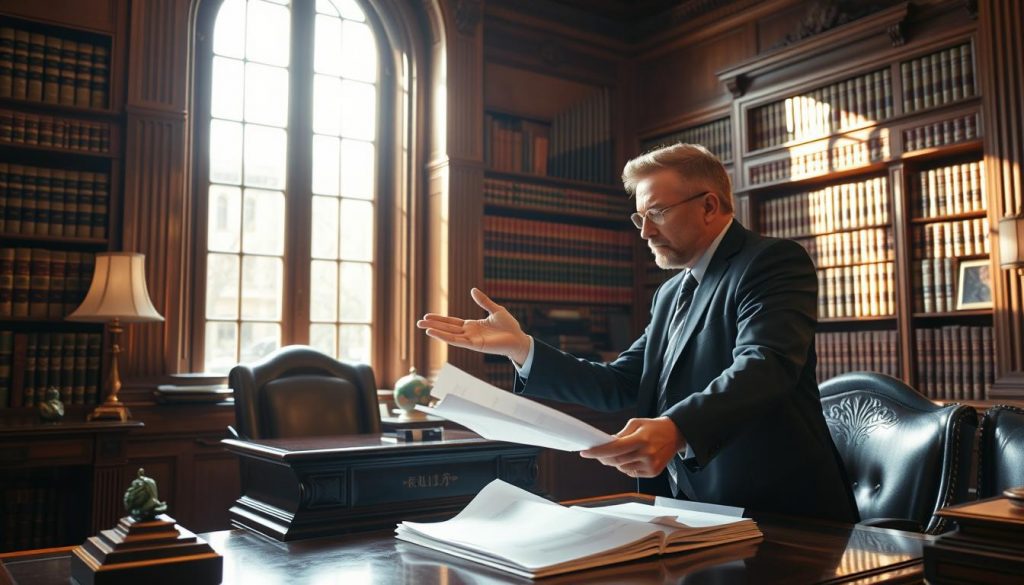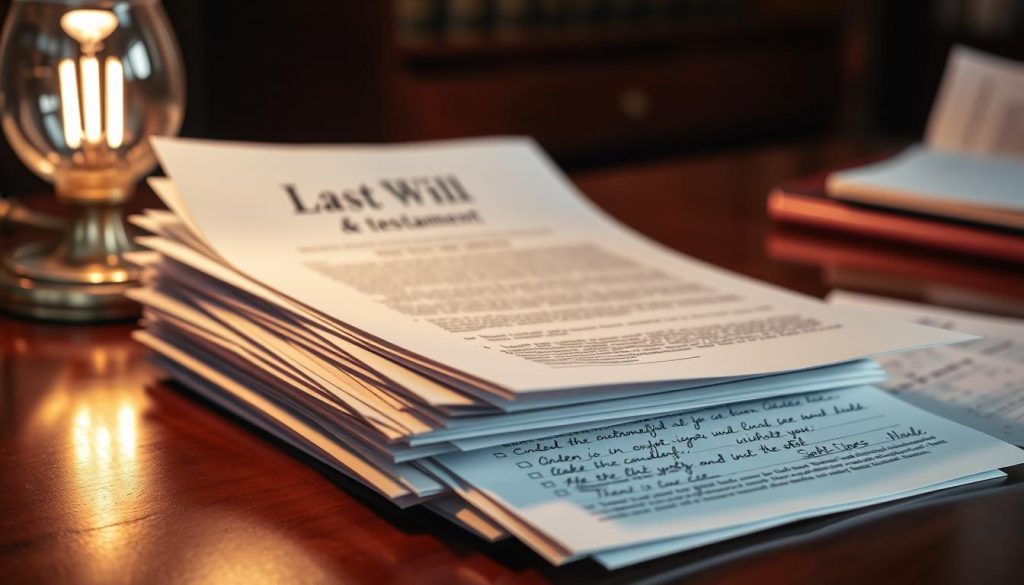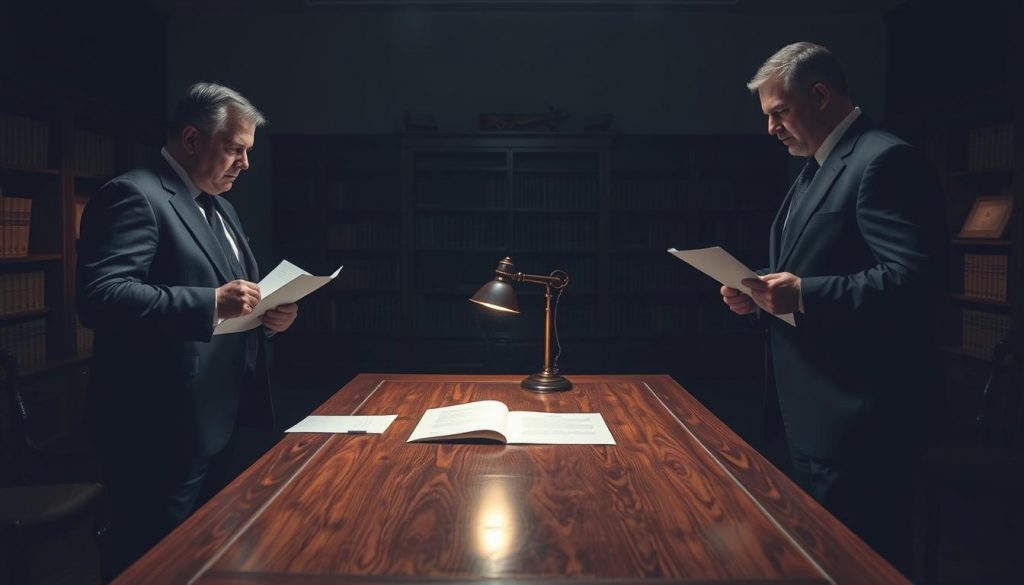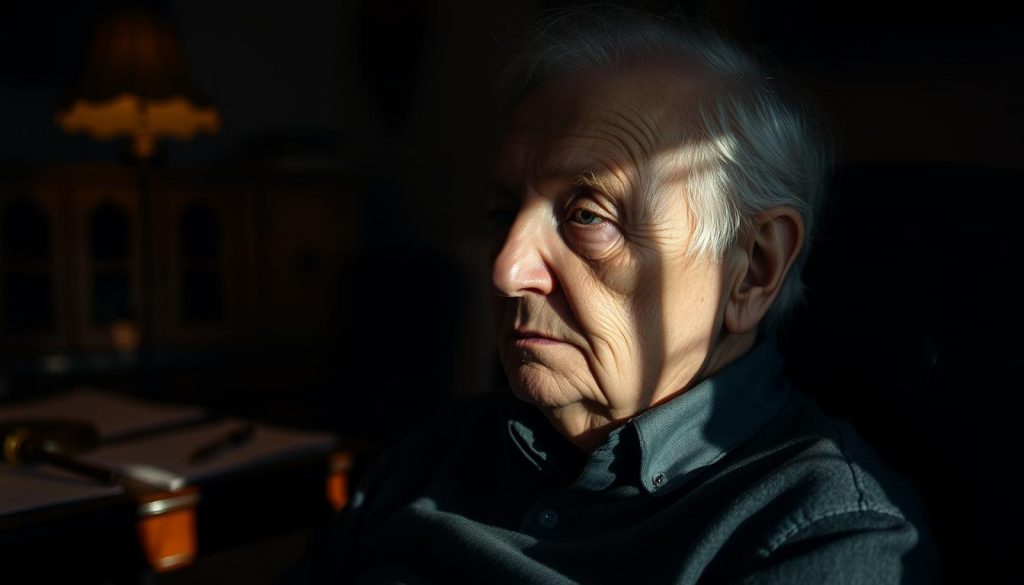Contesting a will can be a complicated and challenging process, often requiring strong evidence to support your case. We understand that questioning the validity of a will can be a daunting task, especially when it involves loved ones.
Whether you’re concerned about undue influence, lack of mental capacity, or potential forgery, gathering the right evidence is crucial. For more information on the types of evidence required, you can visit our resource on contesting a will.
Key Takeaways
- Gathering strong evidence is crucial when contesting a will.
- Concerns about undue influence, mental capacity, and forgery are common grounds for contesting.
- Medical records, witness testimony, and financial records can serve as vital evidence.
- Consulting with an estate litigation lawyer can help tailor a strategy for your case.
- Preserving all versions of the will and related documents is essential.
Understanding the Grounds for Contesting a Will
The process of contesting a will involves understanding the legal grounds on which a will can be disputed. In the UK, the legal system provides several reasons why a will can be contested, and it’s crucial to understand these grounds to proceed with a claim effectively.
Legal Reasons to Contest a Will
There are several legal grounds for contesting a will. These include:
- Lack of testamentary capacity: The testator did not have the mental capacity to make a valid will.
- Undue influence: The testator was coerced or manipulated into making a will that did not reflect their true wishes.
- Fraud: The will was created based on false information or deceit.
- Forgery: The will or parts of it are not genuine.
- Failure to meet legal requirements: The will did not comply with the legal formalities required for its execution.
- Revocation: The testator had revoked the will before their death.
Understanding these grounds is essential for determining whether you have a valid claim. For instance, if you believe that the testator was under undue influence when making the will, you will need to gather evidence to support this claim. You can refer to our guide on contesting a trust to understand more about the legal processes involved.
Common Misconceptions
Many people have misconceptions about contesting a will, often believing it’s an easy or straightforward process. However, it’s a complex legal journey that requires solid grounds and evidence. Some common misconceptions include:
- Believing that a will can be contested simply because you disagree with its contents.
- Thinking that the process is quick and easy.
- Assuming that you can contest a will without legal representation.
It’s essential to dispel these misconceptions and understand that contesting a will requires a thorough understanding of the legal grounds and a well-prepared case.
Importance of Sound Grounds
Having sound grounds for contesting a will is crucial for a successful claim. Without valid legal reasons, your case may not stand up to legal scrutiny, potentially leading to costly legal battles and strained family relationships. Sound grounds not only strengthen your case but also help in navigating the complex legal landscape.

By understanding the legal grounds for contesting a will and being aware of the common misconceptions, you can better prepare yourself for the challenges ahead. Our experienced team is here to guide you through this complex process, ensuring you have the necessary knowledge and support to proceed with your claim.
Types of Evidence Required
Contesting a will requires a thorough collection of relevant evidence to build a strong case. The evidence needed to contest a will can vary, but it generally includes witness testimonies, documentation, and expert evaluations.
Witness Testimonies
Witness testimonies can provide crucial insights into the testator’s state of mind and any potential undue influence. Witnesses may include individuals who were present when the will was signed, such as family members, friends, or legal professionals.
For instance, a witness might testify that the testator was under pressure from a particular individual or was not of sound mind when making the will. Contesting a will in the UK often relies heavily on such testimonies.
Documentation and Records
Documentation and records are vital in establishing the validity of a will. This can include medical records, financial statements, and any other relevant documents that provide context about the testator’s intentions and mental capacity.
For example, medical records can help demonstrate whether the testator had the necessary mental capacity to make informed decisions about their estate.
| Type of Document | Purpose |
|---|---|
| Medical Records | To assess the testator’s mental capacity |
| Financial Statements | To understand the testator’s financial situation and intentions |
| Witness Statements | To provide testimony about the signing of the will and the testator’s state of mind |
Expert Evaluations
Expert evaluations can offer professional insights into the testator’s mental state and the authenticity of the will. Experts might include medical professionals, handwriting analysts, or legal experts.
“Expert testimony can be pivotal in cases where the testator’s mental capacity or the authenticity of the will is disputed.”
For instance, a medical expert can provide an opinion on whether the testator suffered from a condition that could have impaired their judgment.

In conclusion, gathering a comprehensive range of evidence is essential when contesting a will. By combining witness testimonies, documentation, and expert evaluations, individuals can build a robust case to support their claim.
Validating the Will’s Authenticity
To challenge a will effectively, it’s essential to scrutinize its authenticity, focusing on signatures, alterations, and the testator’s state of mind. Validating a will involves several critical steps that help determine its legitimacy and ensure that it reflects the true intentions of the deceased.
Identifying Signatures
The first step in validating a will is to verify the signature of the testator. This involves comparing the signature on the will with other known signatures of the deceased. We often work with handwriting experts who can provide expert testimony on the authenticity of the signature. For more information on the process, you can visit our website at https://mpestateplanning.uk/.

Investigating Alterations
Any alterations or changes made to the will after its initial signing can be a contentious issue. We investigate whether any amendments were made and if they were properly witnessed and signed. This is crucial in determining whether the will accurately represents the testator’s final wishes.
Confirming Testator’s Mental Capacity
Assessing the mental capacity of the testator at the time of signing the will is another vital aspect. We gather medical records and other evidence to evaluate whether the testator was of sound mind and not under undue influence. This involves understanding the testator’s cognitive state and whether they were capable of making informed decisions about their estate.
By meticulously examining these factors, we can build a strong case to support or challenge a will, ensuring that justice is served and the testator’s true intentions are respected.
The Role of Executors and Beneficiaries
The dynamics between executors and beneficiaries can significantly impact the outcome of a will contest. Understanding their roles and responsibilities is essential for navigating the complexities of contesting a will.
Responsibilities of the Executor
An executor is tasked with carrying out the instructions in the will. Their responsibilities include:
- Managing the estate’s assets
- Paying off debts and taxes
- Distributing the remaining assets to beneficiaries
Executors must act in the best interest of the estate and its beneficiaries, ensuring that they follow the testator’s wishes as outlined in the will.
Rights of Beneficiaries
Beneficiaries have the right to receive their inheritance as specified in the will. They also have the right to:
- Be informed about the estate’s administration
- Receive an account of the estate’s assets and liabilities
- Challenge the executor’s decisions if they believe it is not in their best interest
Beneficiaries should be aware of their rights to ensure that their interests are protected during the estate administration process.
Potential Conflicts of Interest
Conflicts of interest can arise when an executor’s personal interests clash with their duties to the estate and its beneficiaries. For instance, if an executor is also a beneficiary, they may be tempted to act in their own favor rather than in accordance with the testator’s wishes. Such conflicts can lead to disputes and potentially lengthy legal battles.
“A conflict of interest can undermine the integrity of the estate administration process, highlighting the need for executors to maintain impartiality.”
To mitigate such risks, it’s crucial for executors to remain transparent and seek legal advice when necessary. Beneficiaries, too, should stay informed and vigilant to protect their interests.
Challenging Undue Influence
Undue influence occurs when someone coerces the testator into making a will that doesn’t reflect their genuine wishes. This can be a complex issue to navigate, but understanding its implications is crucial when contesting a will.
Defining Undue Influence
Undue influence refers to a situation where the testator is subjected to pressure or manipulation that overpowers their free will. This can result in a will that does not accurately represent the testator’s intentions.
To establish undue influence, we need to demonstrate that the testator was coerced or manipulated into making decisions they wouldn’t have otherwise made. This can involve analyzing the relationships between the testator and the individuals involved in the will’s creation.
Collecting Relevant Evidence
Gathering evidence is a critical step in challenging undue influence. Some key pieces of evidence include:
- Witness statements from individuals who observed the testator’s interactions
- Documentation showing the testator’s mental state at the time of the will’s creation
- Records of any suspicious transactions or changes to the will
We must meticulously collect and analyze this evidence to build a strong case.
| Types of Evidence | Description | Importance |
|---|---|---|
| Witness Statements | Testimonies from individuals who knew the testator | High |
| Medical Records | Documentation of the testator’s mental capacity | High |
| Financial Records | Records showing any suspicious transactions | Medium |
Case Studies of Undue Influence
Examining real-life case studies can provide valuable insights into how undue influence can manifest. For instance, in one case, a family member was found to have exerted significant control over a testator, resulting in a will that heavily favored them.
By understanding these examples, we can better navigate the complexities of undue influence and build a stronger case when contesting a will.
Proving Lack of Testamentary Capacity
Proving a lack of testamentary capacity is a critical step in challenging a will. Testamentary capacity refers to the testator’s mental ability to understand the nature of their actions when making the will. It’s essential to gather substantial evidence to support your claim.
Understanding Testamentary Capacity
Testamentary capacity is not just about being of sound mind; it’s about understanding the implications of the will. The testator must be aware of the extent of their assets, the natural beneficiaries of their estate, and the nature of the distribution.
To assess testamentary capacity, we look at several key factors:
- The testator’s ability to understand and appreciate the nature of their actions.
- Their knowledge of the extent of their assets.
- Their understanding of the natural beneficiaries of their estate.
- Their ability to make a rational decision regarding the distribution of their estate.
Key Indicators to Evaluate
Several indicators can help evaluate the testator’s mental capacity:
| Indicator | Description | Relevance to Testamentary Capacity |
|---|---|---|
| Mental State | The testator’s mental health and cognitive function. | Directly impacts their ability to understand and make decisions. |
| Medical Conditions | Presence of conditions that may affect cognitive function. | Can significantly impact testamentary capacity if not properly managed. |
| Witness Testimonies | Statements from individuals who interacted with the testator. | Provides insight into the testator’s mental state and behavior. |
Gathering Medical Records
Medical records are crucial in assessing testamentary capacity. They provide evidence of the testator’s mental and physical health at the time of making the will.
Gathering relevant medical records involves:
- Obtaining records from the testator’s healthcare providers.
- Reviewing diagnoses and treatments related to cognitive function.
- Assessing the impact of medical conditions on the testator’s mental state.

By carefully evaluating these factors and gathering comprehensive evidence, we can build a strong case to support your claim of lacking testamentary capacity.
Importance of Proper Documentation
Proper documentation is the backbone of a successful will contest. When challenging a will, having comprehensive and well-organized evidence is crucial. We guide you through the process, ensuring that you are well-prepared with the necessary documentation.
Types of Supporting Documents
The types of documents required to contest a will can vary, but typically include medical records, financial documents, and witness statements. Medical records are essential in establishing the testator’s mental capacity at the time of signing the will. Financial documents can help demonstrate the testator’s financial situation and any potential undue influence. Witness statements provide firsthand accounts of the testator’s intentions and any potential coercion.
- Medical records to assess testamentary capacity
- Financial documents to understand the testator’s financial situation
- Witness statements to corroborate your claims
Maintaining an Evidence Trail
Maintaining a clear evidence trail is vital. This involves organizing and preserving all relevant documents and records. We recommend creating a detailed inventory of the evidence you have gathered, including witness testimonies, medical records, and any other supporting documents.
| Evidence Type | Description | Importance |
|---|---|---|
| Medical Records | Documents assessing the testator’s mental capacity | High |
| Financial Documents | Records detailing the testator’s financial situation | Medium |
| Witness Statements | Firsthand accounts of the testator’s intentions and potential coercion | High |
Legal Implications of Incomplete Evidence
Incomplete evidence can significantly weaken your case. If crucial documents are missing or witness testimonies are inconsistent, it can be challenging to build a strong argument. We work closely with you to ensure that your evidence is comprehensive and compelling, minimizing the risk of your case being dismissed.
The importance of thorough preparation cannot be overstated. By gathering the right evidence and maintaining a clear evidence trail, you can strengthen your position and improve the chances of a successful outcome.
The Process of Contesting a Will
The process of contesting a will involves several critical steps, from gathering evidence to presenting your case in court. Contesting a will is a significant legal undertaking that requires careful preparation and a thorough understanding of the legal framework.
Steps to Initiate Proceedings
To initiate the process of contesting a will, one must first understand the legal grounds for doing so. This involves reviewing the will and identifying potential issues such as undue influence, lack of testamentary capacity, or improper execution. We recommend consulting with a legal professional to assess the viability of your case.
The next step is to file a claim with the court, which typically involves:
- Preparing and submitting the necessary legal documents.
- Paying the required court fees.
- Notifying the relevant parties, including the executor and beneficiaries.
Time Limits and Deadlines
It is crucial to be aware of the time limits for contesting a will. In the UK, the general rule is that a claim must be made within six months of the date of the grant of probate. However, this can vary depending on the specific circumstances of the case. We advise acting promptly to avoid missing critical deadlines.
For more detailed information on the legal aspects of contesting a will, you can refer to resources such as Katzner Law Group, which provides insights into the evidence needed to contest a will and the grounds for contesting a will in New York.
Potential Outcomes of a Contest
The outcome of contesting a will can vary significantly. Possible results include:
- The court may uphold the will in its entirety.
- The court may declare the will invalid, leading to an intestacy.
- The court may order a redistribution of the estate.
Understanding these potential outcomes is essential for managing expectations and making informed decisions throughout the process of contesting a will in court.
Seeking Legal Advice and Support
Contesting a will can be a complex and emotionally challenging process. We strongly advise seeking legal advice from an experienced solicitor to navigate the intricacies involved. Understanding the legal grounds for contesting a will and gathering the necessary evidence needed to contest a will are crucial steps in building a strong case.
Expert Guidance
Choosing the right solicitor is vital. Look for a professional with experience in will disputes and contesting a will. They will provide valuable insights into the legal process and help you understand the potential outcomes.
Understanding the Costs
The costs involved in contesting a will can vary significantly. It’s essential to discuss these costs with your solicitor to understand the financial implications and plan accordingly.
Additional Resources
Accessing additional resources, such as legal aid or support groups, can provide further assistance throughout the process. We are committed to protecting families’ assets through clear, accessible estate planning guidance.


